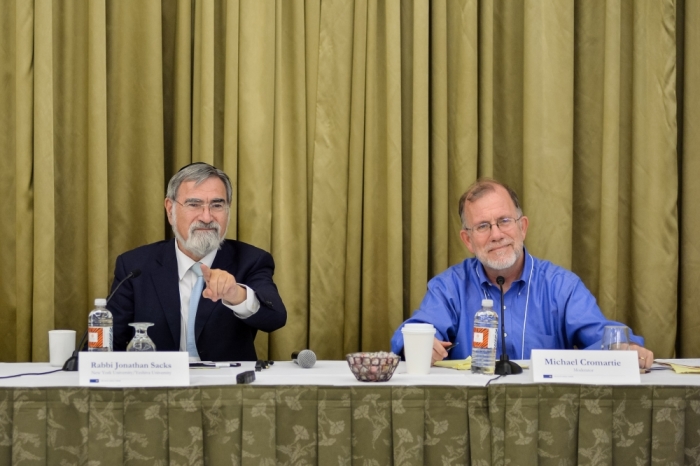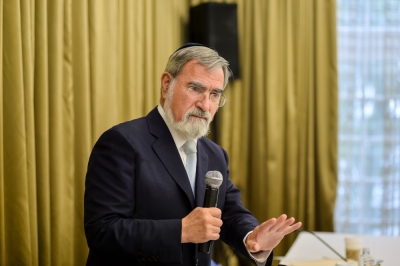Rabbi Jonathan Sacks: Secularism Can't Solve Today's Religious Violence; Answers Rooted in 'Sibling Rivalry' of Jews, Christians, Muslims

MIAMI BEACH — Only a battle of ideas will end the religious violence of the 21st century, Rabbi Jonathan Sacks argues, but unlike the secular ideas that ended the Reformation-era religious violence, solutions to today's violence will be found in the Old Testament.
"I am trying to attempt quite a big theological project, which is, can we construct something called Abrahamic monotheism which is a kind of foundational level on which you build the structures of Judaism, Christianity, and Islam? Is there such a thing as Abrahamic monotheism before we get to our differences? Can we establish in those protean texts a set of agreements?" Sacks questioned at the Ethics and Public Policy Center's Faith Angle Forum in May.
Sacks, the Ingeborg and Ira Rennert Global Distinguished Professor of Judaic Thought at New York University and the Kressel and Ephrat Family University professor of Jewish Thought at Yeshiva University, was discussing ideas from his new book, Not in God's Name: Confronting Religious Violence, which is available now in England and will be available in the United States in October.
Weapons win wars but ideas win the peace, Sacks told the audience of 20 journalists. While the Treaty of Westphalia in 1648 ended the Thirty Years War, it was the ideas of thinkers like John Milton, Thomas Hobbes, John Locke and Benedict Spinoza that won the peace.
Namely, there were five ideas at that time that brought about the end of religious violence and helped create the modern world: 1) social contract or consent of the governed, 2) the moral limits of power, 3) human rights, 4) liberty of conscience and 5) tolerance.
But those 17th century ideas will not work in the 21st century, Sacks continued, because, "the 17th century was the beginning of an age of secularization which has lasted four centuries until now; the 21st century is exactly the opposite, it's the beginning of an age of desecularization. Religion is seizing power; they're not yielding power. ... We are going to have to do the theological work that was not done four centuries ago."
During the Q&A after his remarks, Washington Post columnist Michael Gerson noted that 17th century Liberalism continues to do a lot of good in the world.
"A decline in confidence in those 17th century answers would, in fact, be a tremendous tragedy. ... So I wonder if you're elevating the theological task and underestimating the political philosophic task, which is, in fact, also necessary in this?" he asked.

"Michael, I agree with you 100 percent," he answered, but noted that he often speaks to different audiences in different ways. "The political task is there, I'm just trying to frame it in such a way that it becomes intelligible to somebody who wants to know, where is God in all of this?"
Sacks is not asking Jews, Christians and Muslims to liberalize, secularize or abandon the essential elements of their faith.
"So I am not arguing on secular grounds of liberal democracy, that's the 17th and 18th century solution. I am not calling the Quran a human document that should be subjected to historical criticism; that's the 19th and 20th century solution. I want a 21st century solution for a 21st century problem, and we're not there," he said.
The secular values of liberal Democracy have proven incapable of offering a viable alternative to the Muslims who could become radicalized, Sacks explained.
"I have watched the moral relativism of the West render the West utterly incapable of defending its own values, let alone inspiring idealistic young Muslims," he said. "A culture that can produce bumper stickers saying the guy with the most toys, when he dies, wins, is in my view not going to attract the great and the good."
Sacks weaved together lessons he gleaned from theology, anthropology, game theory, evolution and psychology as he introduced his ideas on how the first three Abrahamic religions can work together toward a common theology of how these faiths treat each other.
Human violence and human compassion come from the same place, he said. Humans first learned to survive in groups. Within these groups they learned that their chances of survival increased when they worked together. Each individual had to put the needs of the group ahead of themselves. This groupish behavior also enabled them to compete against other groups, however, which is the source of violence.
"We are altruistic toward the members of our group, and we are aggressive to the members of other groups, and that makes us both angels and demons at the same time. Angels to the guys like us, and demons to the guys not like us. And that is the source both of virtue and of violence. Virtue and violence are not opposed, they come from the same thing," Sacks explained.
The relationship, then, between religion and violence, Sacks continued, is that religion helps the building of trust within groups.
"We are violent not because we are religious, we are violent because we are social animals, because we form groups ... and religion is the most powerful creator of groups that humanity has ever devised. And to this day it is more powerful than race, than the nation-state and than political ideologies," he said.
Sacks noted that both Judaism and Christianity experienced extreme levels of religious violence about 1,500 years after their founding — Jews killing Jews in the first century and Christians killing Christians in the 15th century. Based upon that "sample of two," Sacks predicted in 2002 that Islam, reaching it's 1,500 birth year, would experience it's violent era during the 21st century. He also just learned while at the conference, that an Islamic text predicted that the 21st century would be apocalyptic.
One commonality during these violent eras, he explained, was a belief that is incompatible with monotheism — dualism.
"They believed that there is a fundamental conflict, a cosmic conflict, between the children of light and the children of darkness. There are two forces operative in the world: the God, or the good God; and the Devil. ... There's an ontological divide — you are either good or bad, light or dark, good God or enemy of God — and there are no shades of gray whatsoever."
This dualism became part of Judaism through Zoroastrianism and became part of Christianity through Greek Gnosticism. A monotheist becomes a dualist by way of "unbearable cognitive dissonance," Sacks said. And when dualism becomes pathological, it is "probably the most dangerous doctrine ever invented," because it demonizes opponents.
(Dualism is also responsible for extreme secular violence, such as Nazi Germany and Stalinist Russia, he pointed out.)
The key to understanding religious violence within the Abrahamic tradition, Sacks believes, is sibling rivalry.
"Judaism, Christianity and Islam are not just three different religions, like Buddhism and Zoroastrianism and Baha'i. They are sibling rivals," he said.
Sibling rivalry, he continued, is a "potent form of violence." It can be found in Greek mythology, Roman mythology, Shakespeare and throughout the Bible. In Genesis alone, Sacks noted, there are many sibling rivalry stories, such as Cain and Abel, Isaac and Ishmael, Jacob and Esau, Joseph and his brothers, and Leah and Rachel.
Sacks' project of developing ideas to win the peace is based upon those sibling rivalry stories found in the texts that the Abrahamic faiths hold in common. Within each of those stories, he said, is a "concealed counter narrative," which he writes about in Not In God's Name. (Journalists at the Faith Angle Forum received a copy of the book and were asked to hold any reviews until the Oct. 6 U.S. publication date.)
Sacks is approaching the Bible as a theological conservative, he made clear. He interprets the stories literally, not by "giving some fancy liberal critical historical reading of the text, I'm doing so as an unreconstructive fundamentalist."
Sacks also does not believe this "big theological project" is fully developed or his alone.
He is "appealing to Jews, Christians, Muslims to stand together, to reason together, for the sake of our humanity, and not to do so in secular terms for the sake of freedom or democracy, but to do so in religious terms for the sake of God and his image, humankind."
You can read the transcript or listen to the audio at the Ethics and Public Policy Center website.




























